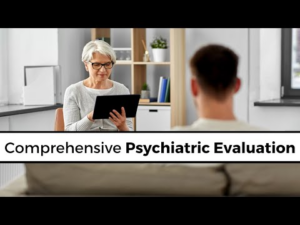PRAC 6645 Comprehensive Psychiatric Evaluation and Patient Case Presentation, Part 1
 Subjective:
Subjective:
Chief Complaint:
The client’s mother reported, “My child is behaving abnormally. He violates the rights of others and bullies his peers. He is getting out of control.”
This statement highlights concerns related to child behavioral disorders such as conduct disorder and other potential adolescent psychiatric disorders.
The mother is worried about childhood aggression and its impact on A.A’s social relationships and academic performance.
History of Present Illness:
A.A is a 13-year-old client referred for psychiatric assessment due to concerning behavior. His mother reported that for the past six months, A.A has exhibited aggressive and disruptive behaviors. These behaviors include bullying peers, making threats, frequent involvement in fights, and even physically harming a friend with a stick during a disagreement.
Recently, A.A was accused of stealing a book at school, which further compounded his mother’s concerns. The mother attempted to address A.A’s behaviors by talking to him and seeking counseling, but these efforts were unsuccessful. Given the escalating frequency of these behaviors, they were referred for a mental health assessment in children to better understand the underlying causes and develop a comprehensive treatment plan.

Struggling to meet your deadline?
Get your assignment on PRAC 6645 Comprehensive Psychiatric Evaluation and Patient Case Presentation, Part 1 done by certified MDs and PhDs in the USA. ORDER NOW!
Past Psychiatric History:
- Caregivers: A.A’s primary caregiver is his mother, who reports she is actively involved in his care and education.
- Hospitalizations: A.A has no history of psychiatric hospitalizations, suggesting no previous severe crises that required inpatient care.
- Medication Trials: There is no history of psychiatric medication use, which may point to the need for an initial nursing psychiatric evaluation before any pharmacological intervention is considered.
- Psychotherapy or Previous Psychiatric Diagnosis: A.A had attempted counseling in the past, but it was not effective, indicating that his mental health treatment plans for children may need to be adjusted or refined to fit his specific needs.

Substance Use and History:
A.A denied any history of substance abuse, which is important for differentiating between conduct disorder and potential substance-induced mood disorders or other psychiatric conditions.
Family Psychiatric/Substance Use History:
A.A’s mother reported a family history of psychiatric illness, including her father, who had depression, and her father-in-law, who had Alzheimer’s disease. There is no known history of substance use disorders in the family, which may influence the assessment of adolescent mental health and help rule out familial substance use as a contributing factor.
Psychosocial History:
A.A is the eldest of three siblings, living with his parents in a stable and supportive environment. He attends junior high school and enjoys activities such as playing with peers and watching television. There is no reported history of childhood trauma or violence. Behavioral health nursing principles suggest that A.A’s environment does not contribute significantly to his behavioral issues, but it is important to explore the family dynamics in child psychiatry to understand the underlying issues. He has no history of involvement with the legal system, which may rule out any external legal or societal pressures influencing his behavior.
Medical History:
- Current Medications: A.A is not currently on any medications, which may suggest that his behaviors are not due to side effects from pharmaceuticals.
- Allergies: There are no reported food, drug, or environmental allergies.
- Reproductive History: A.A is not sexually active and denied any issues with urinary urgency or frequency.
Objective:
Diagnostic Results:
To confirm the diagnosis of conduct disorder, ADHD, or oppositional defiant disorder (ODD), a thorough diagnostic assessment, including a mental health assessment in children, is required. These assessments may include laboratory investigations like blood tests to rule out medical conditions that could mimic or exacerbate psychiatric symptoms. A full psychiatric assessment should be conducted to examine A.A’s cognitive and emotional functioning. While the primary focus will be on behavioral observations, laboratory investigations (such as thyroid function tests) may be conducted to assess for any underlying physical health issues that could be contributing to the behaviors. In rare cases, neuroimaging could be considered if there are any concerns about potential neurological or brain-based issues.
Mental Status Examination:
A.A, a 13-year-old, presented as appropriately dressed without signs of fatigue, agitation, or abnormal movements. He was oriented to place, time, events, and space. His insight appeared intact, and he showed no signs of depressed mood. A.A denied experiencing illusions, delusions, or hallucinations. He also denied any thoughts of suicide, which suggests that his aggression is more related to conduct disorder than an underlying mood disorder. His thought content was future-oriented, indicating some level of cognitive engagement. A.A exhibited normal speech in terms of rate, rhythm, and volume. There were no signs of psychosis or mood disturbances, making psychotic disorders and mood disorders less likely.
Assessment:
Differential Diagnoses:
- Conduct Disorder: A.A’s primary diagnosis is conduct disorder, as he exhibits a pattern of disruptive, aggressive, and violent behaviors that violate societal norms and the rights of others, persisting for over six months. These behaviors are consistent with the DSM-5 diagnosis for conduct disorder, which includes bullying, physical aggression, and theft.
- Attention Deficit Hyperactivity Disorder (ADHD): While A.A demonstrates impulsivity, his behavior is more consistent with conduct disorder rather than ADHD, since his primary issue lies in violation of others’ rights rather than difficulty maintaining attention or impulse control in academic settings.
- Oppositional Defiant Disorder (ODD): ODD is less likely in A.A’s case, as his behaviors involve more than just defiance and include aggressive actions that go beyond what is typical of ODD, such as bullying and physical harm.
Case Formulation and Treatment Plan:
The diagnosis of conduct disorder is based on subjective and objective findings, including reports from the family and the mental status examination. Treatment will involve cognitive behavioral therapy (CBT) to address A.A’s childhood aggression and impulsivity. Behavioral modification therapy will be employed to reduce disruptive behaviors. Family therapy in child psychiatry will be recommended to improve family dynamics and address any underlying stressors contributing to A.A’s behaviors.
Treatment Plan:
- Cognitive Behavioral Therapy (CBT): A.A will engage in CBT to help him develop healthier coping mechanisms and alter his aggressive behaviors. CBT will target skills like impulse control, anger management, and appropriate social interactions, which will be crucial for adolescent behavioral therapy.
- Behavioral Modification Therapy: This will be used to reinforce positive behaviors and discourage aggressive and impulsive actions.
- Family Therapy: Involving A.A’s family in therapy will help address family dynamics in child psychiatry and improve communication strategies. This type of therapy will also support the parents in managing A.A’s behaviors at home.
- Health Promotion and Patient Education Strategies: A.A and his family will be educated about mental health care for children and the importance of consistent therapy and intervention. Additionally, they will receive education about recognizing triggers for aggression and managing stress in healthier ways.

- Follow-up Plan: A.A will follow up in four weeks to evaluate the response to the treatment plan and determine if any adjustments are necessary. Psychiatric nursing documentation will be used to track progress and make data-driven decisions regarding the continuation of therapy.
Psychiatric Notes in Clinical Practice:
Comprehensive psychiatric evaluation notes are essential in clinical practice to document patient care. These notes include the psychiatric case presentation and are used for psychiatric nursing documentation, which helps ensure the continuity of care and supports clinical decision-making.
For this nursing assignment, you will document your findings and observations from your psychiatric assessment of a patient, then develop a psychiatric case study in children. Be sure to include all relevant psychiatric interventions for children, including the health promotion in psychiatry and family therapy in child psychiatry interventions.
BY DAY 7
Submit your Video and Comprehensive Psychiatric Evaluation Note. You must submit two files for the evaluation note, including a Word document and scanned pdf/images of each page that is initialed and signed by your Preceptor.
SUBMISSION INFORMATION – PART 1: RECORDING
To submit your video response entry:
- Click on Start Assignment near the top of the page.
- Next, click Text Entry and then click the Embed Kaltura Media button.
- Select your recorded video under My Media.
- Check the box for the End-User License Agreement and select Submit Assignment for review.
SUBMISSION INFORMATION – PART 2: COMPREHENSIVE PSYCHIATRIC EVALUATION NOTE
To submit Part 2 of this Assignment, click on the following link:

Dont wait until the last minute.
Provide your requirements and let our native nursing writers deliver your assignments ASAP.

